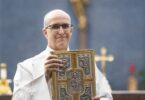
Leon Suprenant is the pastoral associate for administration in the office of the permanent diaconate. He also blogs at: www.archkck.org/blog.
by Leon Suprenant
Since accepting our third cohort of deacon candidates last year, I’ve received several inquiries regarding our candidate Jody Madden.
Some people, upon reading the list of candidates, wondered whether Jody was a woman. They had read somewhere that the pope was possibly interested in ordaining women as deacons (or deaconesses) and were wondering if that was the direction we were taking.
As it turns out, Jody is a man, and no, we do not have any women preparing for ordained ministry as deaconesses. But the question is worth examining a little more closely.
There are two steps in the church’s logic in not ordaining women to the diaconate. First, the church teaches that only a baptized man may validly receive the sacrament of holy orders. Second, the church teaches that the permanent diaconate (“deacons”) is one of three degrees of holy orders, the other two being the episcopate (“bishops”) and the presbyterate (“priests”).
The church recognizes that the fact that Christ is male and not female is neither incidental nor unimportant when it comes to the way God saves us. That’s because the ordained minister serves in the person of Christ the bridegroom in relation to his bride, the church.
So why are there questions about this? If one becomes a deacon through the sacrament of holy orders, and holy orders may only be received by a man, what is left to discuss?
Well, while the church has defined that the episcopate and presbyterate are reserved only to men, this formal definition did not extend to the diaconate. So while we must be faithful to where the church is now, the door remains slightly ajar.
Furthermore, there were “deaconesses” in the New Testament and early church. However, they were not understood to be ordained ministers. “Deacon” means “servant” or “minister.” Just as today we use the term “minister” both for ordained ministries as well as other types of church service, it is understandable that the term would be used in different ways back then.
So we must be clear that if the church were to have “deaconesses” in the future, they would not be ordained ministers in the way that bishops, priests and deacons are.
More reflection is needed on this topic, which is why Pope Francis recently established a commission to study the matter.
There is clearly a need for greater inclusion of the “feminine genius” at all levels of the church’s life, and many women, especially women religious, already “do” many extraordinary ministries. But ordination is about being, not doing.
Deacons, in the person of Christ the servant and bridegroom, remind all the baptized — male and female — to embrace the universal call to service in the church.


This “study” is a transparent pretext to introduce female priests and bishops. First we got female readers at mass, then female extraordinary ministers of holy communion, then altar girls, then the Pope washed the feet of women on Holy Thursday, next female deacons, finally female priests and bishops. It can’t happen? You watch. And also watch “conservative” Catholics furrow their brows and be troubled-in-spirit, but go along for the ride anyway.